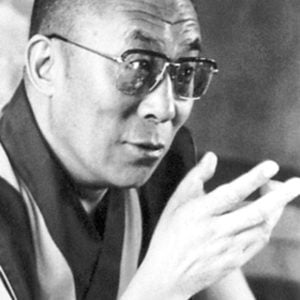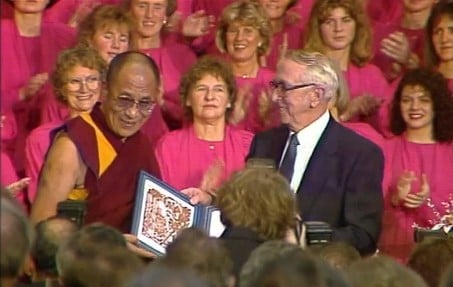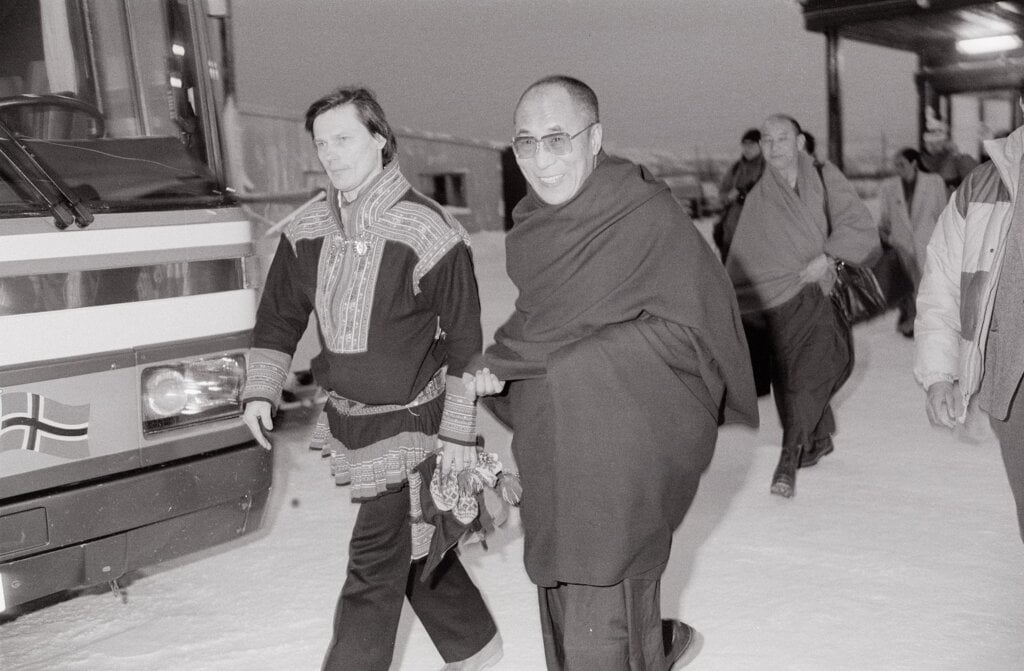The 14th Dalai Lama
Speed read
The 14th Dalai Lama was awarded the Nobel Peace Prize for advocating peaceful solutions based upon tolerance and mutual respect in order to preserve the historical and cultural heritage of the Tibetan people.

Full name: The 14th Dalai Lama (Tenzin Gyatso)
Born: 6 July 1935, Taktser, Tibet (now China)
Date awarded: 5 October 1989
Buddhist peace advocate
Since the 1950s, the Dalai Lama, the religious and political leader of the Tibetan people, has led the campaign to end China’s occupation of Tibet. The Dalai Lama builds his Buddhist philosophy of peace on veneration for all living things and the concept of universal responsibility for the well-being of both humankind and nature. Despite brutal abuses, he has held fast to his belief in non-violent resistance and his desire for reconciliation and compromise. Receiving the peace prize gave the Dalai Lama the opportunity to put forward a plan for peace and human rights in Tibet. The aim of the plan was to initiate serious negotiations about the country’s future, which the Chinese government has steadfastly rejected. The Dalai Lama continues to live in exile in India.
”As a Buddhist monk it was his duty never to harm any living creature, but instead to show compassion to all life.”
Egil Aarvik, Presentation Speech, 11 December 1989.
The Dalai Lama’s peace plan
The Dalai Lama presented his plan for peace and human rights in Tibet in his Nobel Prize lecture. He proposed turning the country into a demilitarised, ecological buffer state between India and China. He also demanded a halt in Chinese immigration and requested the start of negotiations on Tibet’s future status, which the leaders in Beijing have rejected.

”The fact that prominent representatives for the state, Government and Storting attended the award ceremony implies official support for the activities conducted by the Dalai Lama clique to divide China. This is perceived as interfering significantly in internal Chinese affairs.”
Statement from the Chinese Government in the Norwegian daily Morgenbladet, 12 December 1989.
The first peace prize with an ecological perspective
The Dalai Lama’s peace prize was the first to be awarded on ecological grounds. In his presentation speech, Chairman of the Norwegian Nobel Committee Egil Aarvik explained: “The world has shrunk. Increasingly peoples and nations have grown dependent on one another. No one can any longer act entirely in his own interest. It is therefore imperative that we should accept mutual responsibility for all political, economic … and ecological problems.”
A prize to protect minority rights
The Norwegian Nobel Committee has never given its unconditional support to a national liberation movement. Honouring the Dalai Lama with the Nobel Peace Prize did not imply that the committee was backing Tibet’s demand for independence. Rather, the award was in defence of the rights of a minority people within China’s borders. This was well received by the Sámi minority in Norway. In their struggle to safeguard their indigenous rights, the Sámi have drawn inspiration from the Dalai Lama’s philosophy of non-violence. They invited the Dalai Lama to visit the Sámediggi (Sami Parliament) in Kautokeino.

The Dalai Lama’s “inner peace”
In his Nobel Prize lecture, the Dalai Lama elaborated on his definition of peace from a Tibetan Buddhist perspective: “Inner peace is the key: if you have inner peace, the external problems do not affect your deep sense of peace and tranquility. In that state of mind you can deal with situations with calmness and reason, while keeping your inner happiness. That is very important. Without this inner peace, no matter how comfortable your life is materially, you may still be worried, disturbed or unhappy because of circumstances.”
”Peace, in the sense of the absence of war, is of little value to someone who is dying of hunger or cold. It will not remove the pain of torture inflicted on a prisoner of conscience. It does not comfort those who have lost their loved ones in floods caused by senseless deforestation in a neighbouring country.”
Dalai Lama, Nobel Prize lecture, 11 December 1989.
Learn more
His Holiness the XIVth Dalai Lama, Tenzin Gyatso, is the spiritual and temporal leader of the Tibetan people. He was born in a small village called Taktser in northeastern Tibet. Born to a peasant family, His Holiness was recognized at the age of two, in accordance with Tibetan tradition, as the reincarnation of his predecessor the 13th Dalai Lama ...
Disclaimer: Every effort has been made by the publisher to credit organisations and individuals with regard to the supply of photographs. Please notify the publishers regarding corrections.
Nobel Prizes and laureates
Six prizes were awarded for achievements that have conferred the greatest benefit to humankind. The 12 laureates' work and discoveries range from proteins' structures and machine learning to fighting for a world free of nuclear weapons.
See them all presented here.
